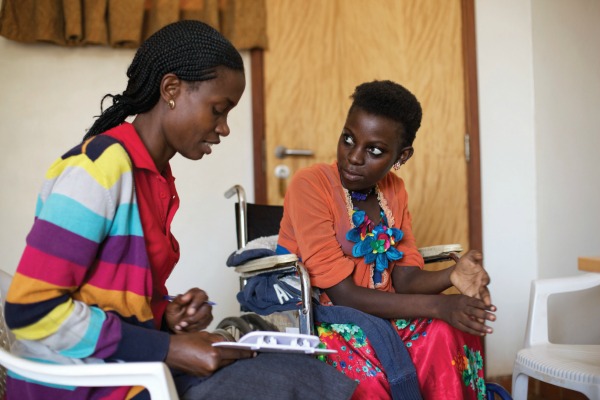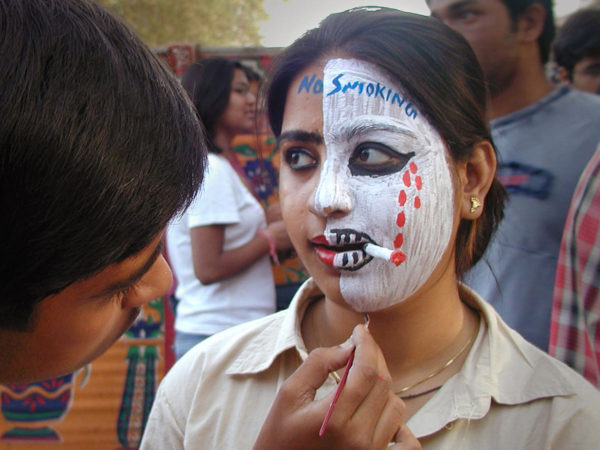No longer a disease of the West, cancer is responsible for one in six deaths worldwide, with about 70 percent of cancer deaths occurring in low- and middle-income countries according to the World Health Organization. But in these countries, with so much focus on communicable diseases, cancer has gotten little attention, stoking fear and misinformation that can often delay diagnosis until it is too late.
In response, the Johns Hopkins Center for Communication Programs (CCP) was engaged by the American Cancer Society (ACS) to partner with governments and cancer control organizations in Ethiopia, Kenya and Uganda to adapt the Society’s U.S.-based patient education materials for an East African audience. The materials and an online toolkit they developed provide critical and evidence-based information about cancer, its diagnosis and treatment, and caregiving.
“In the United States, doctors, patients and even the general population are mostly familiar with cancer and its treatment,” says Ambassador Sally Cowal, senior vice president for the ACS Global Cancer Control Unit. “But in some of the countries we work in, the signs, symptoms and causes of the disease are often misunderstood – even by the medical community – which can delay diagnosis and reduce the chance of successful treatment.”
In some parts of Africa, many people believe cancer is a punishment for a sin or the result of witchcraft or a curse. In some instances, a cancer diagnosis is far more stigmatizing than a diagnosis of HIV.
“More and more people are being diagnosed with cancer and very few people in these countries know anything about it,” says Cheryl Lettenmaier, regional technical advisor for CCP in Uganda, who worked on the project. “People are terrified, rumors abound and the way cancer patients are treated is heart-wrenching. By giving them more and better information, cancer patients can make decisions about what to do about their lives and their treatment, and their families can learn how to help.”
The adapted materials – which include booklets and educational flip charts for health workers to use when talking to patients – aren’t one-size-fits-all. In each country, teams held focus group discussions and in-depth interviews with health care providers, cancer patients, and caregivers to determine general knowledge about cancer and treatment, and to understand why cancer diagnoses often come so late. They found significant knowledge gaps, widespread misconceptions and stigma, and lack of community support for patients living with cancer and their families.
“When people come and ask me what made me sick, I do not tell them it is cancer,” one Ethiopian patient told the researchers. “I do not tell them because people will abandon me, they think it will ‘stick’ to them.”
The African materials are geared at those who have already been diagnosed and their families, and they directly counter the misconceptions found in each country. Cancer isn’t contagious, the materials explain. A biopsy doesn’t spread the cancer; it helps diagnose it. Radiation therapy doesn’t burn a hole in the body.
“Cancer is NOT caused by witchcraft or any supernatural force,” the Uganda booklet explains. “Cancer is a disease that can affect anyone, anywhere, in any country, at any time.”
“Because there isn’t enough good information about cancer in these countries, many patients are taken advantage of by opportunists who offer ‘cures’ for large sums of money, ‘cures’ that have no basis in science and do not work,” Lettenmaier says. “Now we can give people good information to help them guide their decisions.”
The materials are available in an online toolkit so that other countries can print them as is or adapt them based on the needs of their population. The toolkit helps users learn the process for determining what misconceptions are most common in their countries and how to address them. It also provides the core content appropriate for any new patient education booklet and tips for how to adapt the information, so that organizations can feel confident that their new resource is accurate, comprehensive, and tailored to meet local needs.
“The ACS has so much high-quality information about cancer at its disposal and it was important for us to make it not only accessible to many more people across the globe, but also to ensure that it was locally relevant and culturally appropriate” Cowal says. “We are already hearing such positive feedback from the communities that are using the materials. We want as many people as possible to benefit from them.”
Moving forward, the ACS and CCP are entering a new partnership to create culturally appropriate cancer prevention materials geared toward healthy populations. Pilot projects will be launched later this year in India, Kenya and Uganda and an adaptation toolkit for prevention materials should be available online before the end of the year.




